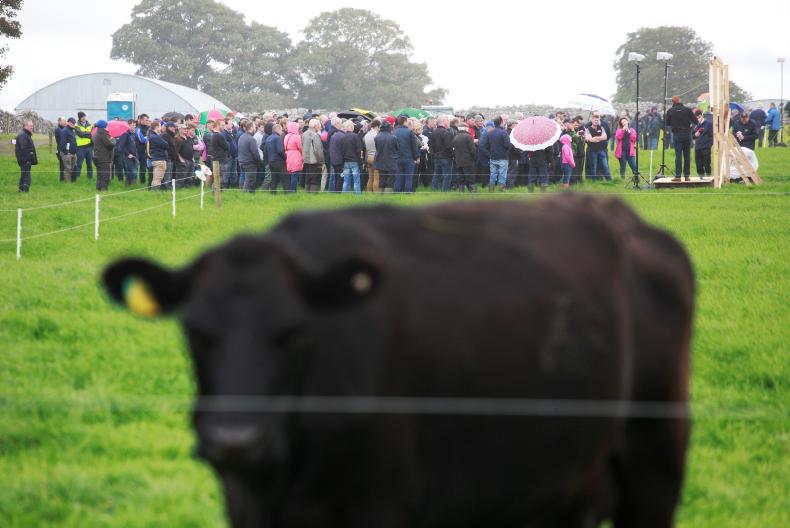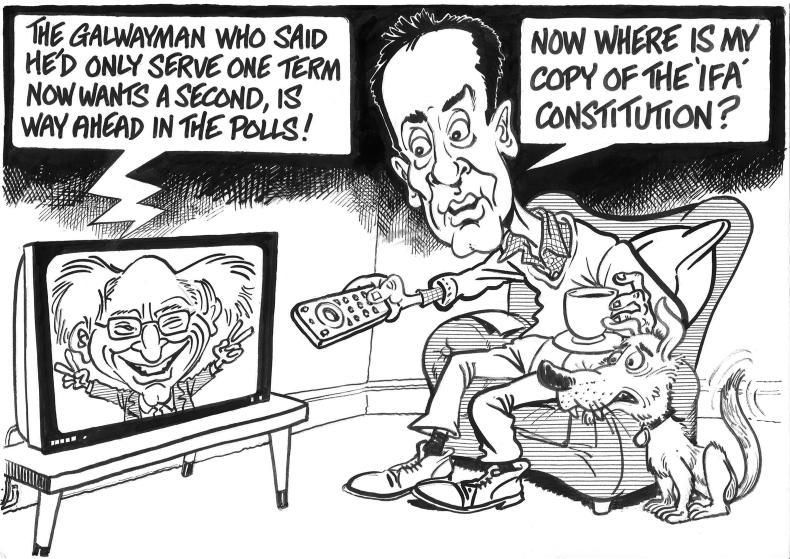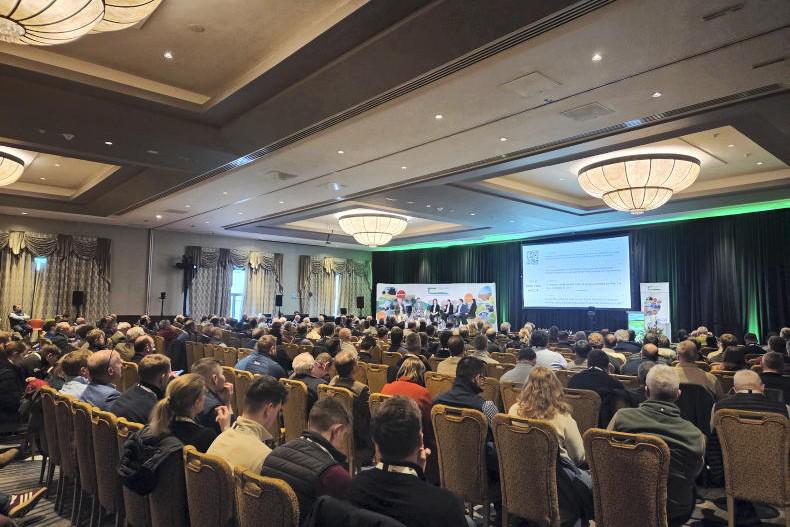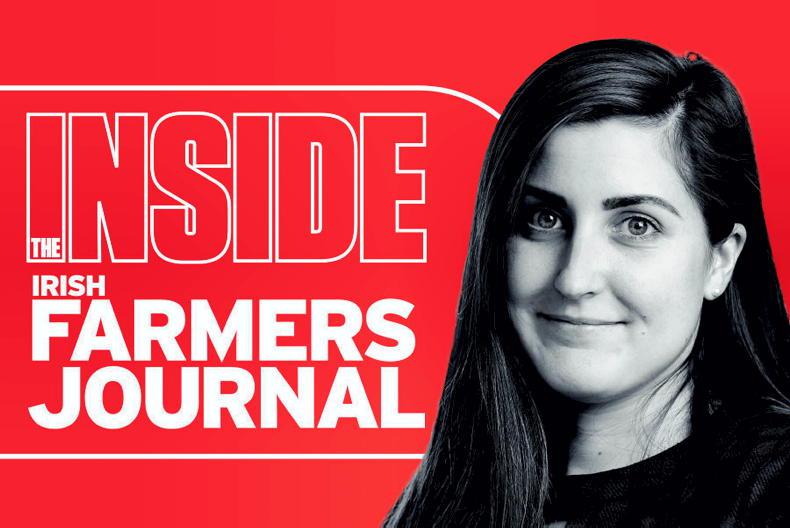There are just seven weeks to go until the EU leaders summit in October, where the Brexit deal is supposed to be signed off. Although still the official position, it is clear that privately both sides are working towards a date in November.
However, even November looks challenging. The turmoil within the British government and the uncertainty that this creates around Theresa May’s ability to deliver on any agreement is adding complication to already complex negotiations.
Against such a backdrop, it is no surprise that we hear continued warnings to prepare for a no-deal Brexit. While not without impact on markets, such warnings will be par for the course in what is an extremely public-facing negotiation process.
While there is no doubt that some politicians see an opportunity to gain political momentum from engaging in such activity, those at the sharp end appear to be making progress in the background.

AROUND THE EDITOR’S TABLE: An Tánaiste and Minister of Foreign Affairs Simon Coveney outlining the Government position on Brexit and CAP to Irish Farmers Journal editor Justin McCarthy and global market intelligence specialist
Phelim O’Neill in the Irish Farmers Journal offices this week. Read the full interview on page 17. \ Philip Doyle
As Tánaiste and Minister for Foreign Affairs with responsibility for Brexit Simon Coveney is deeply embedded in this process. Having been widely praised for his skilful negotiations during CAP reform, then as Minister for Agriculture, Coveney has real credibility in Brussels and understands how the political process works. There is no doubt that his political skills will be fully tested in ensuring Ireland’s economic future is protected as negotiations come down to the wire.
Coveney’s political skills will be fully tested in ensuring Ireland’s economic future is protected
As Phelim O’Neill reports , we welcomed the Tánaiste to the Irish Farmers Journal offices this week for a briefing on how negotiations were likely to progress in the months ahead and what the Irish Government were doing to protect Irish interests – and in particular those of our agri-food sector.
Coveney has clearly been working closely with Minister for Agriculture Michael Creed, stressing that the challenges facing agri food were well understood. Following on from our interview with An Taoiseach Leo Varadkar in July, Coveney reinforced the Government’s firm view that Ireland will not be “abandoned” by the EU. His comments come amid increased concerns that if it were only Irish issues that prevented a Brexit deal, then the EU’s focus on protecting Ireland could shift significantly.
Chequers plan
While clearly committed to the view that there will be a Brexit deal, Coveney is well aware of the political tightrope that the Irish Government will have to walk. He acknowledged the merits of the proposal within the Chequers plan for a shared common rulebook for goods and agricultural products, which would alleviate many Irish concerns. However, he was also quick to point out that the EU could not accept nor would Ireland support any proposal that allowed the UK cherry-pick which of the four freedoms it wished to accept.
The Government is acutely aware of the risks of being seen to ride two horses, with Coveney stressing that Ireland remains part of the EU and therefore committed to protecting the EU’s four freedoms: goods, capital, services and people. However, despite being widely criticised from opposite ends within the UK and Brussels, there are elements in the Chequers proposal that could move the process forward. Comments by Theresa May indicating that she would accept compromises that were “in the national interest” point to the fact that there is the potential to bridge the gaps on both sides.
Given Ireland’s need to secure a favourable outcome alongside our position as a loyal EU member and our strong relationship with the UK, we are ideally placed to act as an honest broker to bridge the gaps and secure a deal that protects Irish interests.
Backstop for farmers
The Government also finds itself walking a tightrope when it comes to demands for measures that will protect farm incomes if there is no deal. If they mention a sum of money it would be seen as the price Ireland was prepared to accept for accommodating a hard Brexit.
While numbers will not be discussed, the Tánaiste did indicate that discussions around the EU’s multi-annual financial framework (MFF) recognise the need for a Brexit contingency that would be used to ensure member states severely impacted would receive support.
In the absence of outlining hard measures, we have to take the Government’s assurances at face value that both it and the EU will not abandon farmers, whatever the outcome. Farmers will interpret this as a clear commitment that their incomes will be protected and that the full suite of market management tools will be deployed to protect farmgate prices in the event of a market collapse.
Beef: processors get first-hand taste of profit challenges

The Newford Farm Open Day in Co Galway.
The Newford suckler farm in Athenry, managed by Dawn Meats, is showing that the beef price paid by Irish meat factories is not adequate to deliver efficient suckler-to-beef farmers a profit – and that’s before any value is placed on either labour or land.
As Darren Carty and Adam Woods report, farmers attending the open day on the Newford Farm on Wednesday learned that the suckler-steer beef system, which operated on good quality land, is projected to make a loss before land rent and labour of €10,000 in 2018 . When typical land and labour charges are factored into the equation, the farm is generating a loss of almost €60,000, or over €1,000/ha.
The figures clearly show just how dependent the sector and the jobs it sustains are on CAP support. While defending CAP is often left to farmers, industry players clearly have an interest in ensuring future payments are targeted at the vulnerable sectors.
The work being carried out on the farm, which is supported by Teagasc, the Irish Farmers Journal and McDonalds, also exposes just how fragile the steer beef system is. The figures clearly show that opting for the steer route over young bulls is dramatically reducing farm output without delivering the necessary cost savings or added return necessary from the market.
There are also questions on the type of replacement now coming from the dairy herd. With greater emphasis on AA/Hereford bloodlines with short gestation and ease of calving, the suitability of this replacement compared to the traditional Lim/Fr on which much of the Grange research was based is under the spotlight. While there are clearly lessons for farmers, there are perhaps even more lessons for meat processors and their customer base.
Ploughing: Irish farmers driving success in the furrows

It has been a hugely successful few weeks for Ireland on the world ploughing stage. Last week, Anna May McHugh’s contribution was recognised internationally and she was appointed as an honorary board member of the World Ploughing Organisation. The prestigious appointment was quickly followed with success in the field as Carlow’s Eamonn Tracey won the conventional class and Thomas Cochrane won the reversible contest for Northern Ireland at the World Ploughing Championships in Germany. It is a remarkable achievement that we will no doubt have the opportunity to acknowledge at the National Ploughing Championships.
Pigs: sector bracing itself for a perfect storm
The pig sector is facing a perfect storm of rising costs and falling prices. Unless there is a significant turnaround in the near further, we will see further significant consolidation in the sector.
As Ciaran Carroll of Teagasc details on page 48, pig farmers have seen margins over feed drop to a 15-year low of 30c/kg, just 60% of what is required to deliver farmers a sustainable return.
Processors and retailers appear reluctant to engage with the supply base on which they depend.
Unless this changes and there is a commitment to share the financial exposure to factors over which farmers have no control, we are going to see a major structural change in the sector.
Farmers will watch with interest the outcome of the meetings with Musgraves in the coming days.
As Lorcan Allen reports, Arla will pay all its 2018 profits (up to €310m) to members to compensate for drought. Farmers are set to get an average payment of €28,000. In a year where extreme weather has eroded profits, Arla’s once-off payment shows its financial muscle and allows farmers finish the year in profit.
Read more
Watch: EU and Ireland won't abandon Irish farmers – Coveney
Newford Farm struggling for profit despite technical efficiencies
Arla will pay all its 2018 profits out to farmers after 'extraordinary' drought
There are just seven weeks to go until the EU leaders summit in October, where the Brexit deal is supposed to be signed off. Although still the official position, it is clear that privately both sides are working towards a date in November.
However, even November looks challenging. The turmoil within the British government and the uncertainty that this creates around Theresa May’s ability to deliver on any agreement is adding complication to already complex negotiations.
Against such a backdrop, it is no surprise that we hear continued warnings to prepare for a no-deal Brexit. While not without impact on markets, such warnings will be par for the course in what is an extremely public-facing negotiation process.
While there is no doubt that some politicians see an opportunity to gain political momentum from engaging in such activity, those at the sharp end appear to be making progress in the background.

AROUND THE EDITOR’S TABLE: An Tánaiste and Minister of Foreign Affairs Simon Coveney outlining the Government position on Brexit and CAP to Irish Farmers Journal editor Justin McCarthy and global market intelligence specialist
Phelim O’Neill in the Irish Farmers Journal offices this week. Read the full interview on page 17. \ Philip Doyle
As Tánaiste and Minister for Foreign Affairs with responsibility for Brexit Simon Coveney is deeply embedded in this process. Having been widely praised for his skilful negotiations during CAP reform, then as Minister for Agriculture, Coveney has real credibility in Brussels and understands how the political process works. There is no doubt that his political skills will be fully tested in ensuring Ireland’s economic future is protected as negotiations come down to the wire.
Coveney’s political skills will be fully tested in ensuring Ireland’s economic future is protected
As Phelim O’Neill reports , we welcomed the Tánaiste to the Irish Farmers Journal offices this week for a briefing on how negotiations were likely to progress in the months ahead and what the Irish Government were doing to protect Irish interests – and in particular those of our agri-food sector.
Coveney has clearly been working closely with Minister for Agriculture Michael Creed, stressing that the challenges facing agri food were well understood. Following on from our interview with An Taoiseach Leo Varadkar in July, Coveney reinforced the Government’s firm view that Ireland will not be “abandoned” by the EU. His comments come amid increased concerns that if it were only Irish issues that prevented a Brexit deal, then the EU’s focus on protecting Ireland could shift significantly.
Chequers plan
While clearly committed to the view that there will be a Brexit deal, Coveney is well aware of the political tightrope that the Irish Government will have to walk. He acknowledged the merits of the proposal within the Chequers plan for a shared common rulebook for goods and agricultural products, which would alleviate many Irish concerns. However, he was also quick to point out that the EU could not accept nor would Ireland support any proposal that allowed the UK cherry-pick which of the four freedoms it wished to accept.
The Government is acutely aware of the risks of being seen to ride two horses, with Coveney stressing that Ireland remains part of the EU and therefore committed to protecting the EU’s four freedoms: goods, capital, services and people. However, despite being widely criticised from opposite ends within the UK and Brussels, there are elements in the Chequers proposal that could move the process forward. Comments by Theresa May indicating that she would accept compromises that were “in the national interest” point to the fact that there is the potential to bridge the gaps on both sides.
Given Ireland’s need to secure a favourable outcome alongside our position as a loyal EU member and our strong relationship with the UK, we are ideally placed to act as an honest broker to bridge the gaps and secure a deal that protects Irish interests.
Backstop for farmers
The Government also finds itself walking a tightrope when it comes to demands for measures that will protect farm incomes if there is no deal. If they mention a sum of money it would be seen as the price Ireland was prepared to accept for accommodating a hard Brexit.
While numbers will not be discussed, the Tánaiste did indicate that discussions around the EU’s multi-annual financial framework (MFF) recognise the need for a Brexit contingency that would be used to ensure member states severely impacted would receive support.
In the absence of outlining hard measures, we have to take the Government’s assurances at face value that both it and the EU will not abandon farmers, whatever the outcome. Farmers will interpret this as a clear commitment that their incomes will be protected and that the full suite of market management tools will be deployed to protect farmgate prices in the event of a market collapse.
Beef: processors get first-hand taste of profit challenges

The Newford Farm Open Day in Co Galway.
The Newford suckler farm in Athenry, managed by Dawn Meats, is showing that the beef price paid by Irish meat factories is not adequate to deliver efficient suckler-to-beef farmers a profit – and that’s before any value is placed on either labour or land.
As Darren Carty and Adam Woods report, farmers attending the open day on the Newford Farm on Wednesday learned that the suckler-steer beef system, which operated on good quality land, is projected to make a loss before land rent and labour of €10,000 in 2018 . When typical land and labour charges are factored into the equation, the farm is generating a loss of almost €60,000, or over €1,000/ha.
The figures clearly show just how dependent the sector and the jobs it sustains are on CAP support. While defending CAP is often left to farmers, industry players clearly have an interest in ensuring future payments are targeted at the vulnerable sectors.
The work being carried out on the farm, which is supported by Teagasc, the Irish Farmers Journal and McDonalds, also exposes just how fragile the steer beef system is. The figures clearly show that opting for the steer route over young bulls is dramatically reducing farm output without delivering the necessary cost savings or added return necessary from the market.
There are also questions on the type of replacement now coming from the dairy herd. With greater emphasis on AA/Hereford bloodlines with short gestation and ease of calving, the suitability of this replacement compared to the traditional Lim/Fr on which much of the Grange research was based is under the spotlight. While there are clearly lessons for farmers, there are perhaps even more lessons for meat processors and their customer base.
Ploughing: Irish farmers driving success in the furrows

It has been a hugely successful few weeks for Ireland on the world ploughing stage. Last week, Anna May McHugh’s contribution was recognised internationally and she was appointed as an honorary board member of the World Ploughing Organisation. The prestigious appointment was quickly followed with success in the field as Carlow’s Eamonn Tracey won the conventional class and Thomas Cochrane won the reversible contest for Northern Ireland at the World Ploughing Championships in Germany. It is a remarkable achievement that we will no doubt have the opportunity to acknowledge at the National Ploughing Championships.
Pigs: sector bracing itself for a perfect storm
The pig sector is facing a perfect storm of rising costs and falling prices. Unless there is a significant turnaround in the near further, we will see further significant consolidation in the sector.
As Ciaran Carroll of Teagasc details on page 48, pig farmers have seen margins over feed drop to a 15-year low of 30c/kg, just 60% of what is required to deliver farmers a sustainable return.
Processors and retailers appear reluctant to engage with the supply base on which they depend.
Unless this changes and there is a commitment to share the financial exposure to factors over which farmers have no control, we are going to see a major structural change in the sector.
Farmers will watch with interest the outcome of the meetings with Musgraves in the coming days.
As Lorcan Allen reports, Arla will pay all its 2018 profits (up to €310m) to members to compensate for drought. Farmers are set to get an average payment of €28,000. In a year where extreme weather has eroded profits, Arla’s once-off payment shows its financial muscle and allows farmers finish the year in profit.
Read more
Watch: EU and Ireland won't abandon Irish farmers – Coveney
Newford Farm struggling for profit despite technical efficiencies
Arla will pay all its 2018 profits out to farmers after 'extraordinary' drought














SHARING OPTIONS